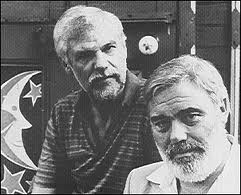 |
| Ray Galton & Alan Simpson |
From the late eighties through most of the nineties I had a writing partner. I was writing comedy and it made sense. When we went our different ways I discovered that I had the confidence to strike out on my own but in a new direction, drama. Over the past twelve years I've become comfortable with being the only person in the room. I'm hardly unique. However, if you read this blog regularly you'll have picked up that lately I've been writing a sit-com pilot and whilst I'm happy to bash out the first draft I really think that another brain (or, if you're working on a US show, another eight brains) helps. So, once I've finished, off it goes in the email to my writing buddy. He adds, edits, punches up and back it comes and then I do the same. Are we a partnership? I'm sure neither of us think of it that way. We're writing WITH each other, enhancing, polishing the final script. Morecambe and Wise were a double act, The Two Ronnies were individuals who worked together - I think we're more like the latter.
 |
| Ricky Gervais and Stephen Merchant |
What we do is write separately then bring our contributions together. When it comes to comedy I really do think that two brains are better than one. But there has to be chemistry, you both need to understand where the other one is coming from and where he/she's going - and you must TRUST each other. We know where each of our individual strengths are and we play to them.
Two brains should mean twice the funny. If one has missed the opportunity for a line the other can catch it and fill it in the rewrite. If you can top the line that's already there do it in the rewrite. Hone, polish, rewrite. Take out everything that doesn't service the story or move the character on. Of course there has to be a moment when you say - okay, that's enough. But you should never finish, never say 'that'll do'. Not until it's shot and in the can. But there has to be a point at which you say, 'that's it, I'm happy for now. It can go out.' Our show went 'out' this week.
The other thing about writing with someone else is that rewrites get done much quicker. I do believe that once you begin a script speed helps (you should leave the writing until you're sure of your characters and your plots - really sure ). You need pressure, you need a deadline, even if it's a false one. I've talked to first time writers who've spent a year, more, crafting a thirty minute sitcom. Forget it. If it really took you that long, how long would it take you to write a series? The pixie dust doesn't get magically sprinkled with a stamp that says 'commissioned'. If you really want to write, drama, sitcom, whatever you should spend all your spare time thinking about what you're going to write and writing. You should also spend a good portion of your time reading other scripts and watching TV. Learn from others.
If you're finding it tough but you think you have a comedy voice look around for a partner. It may be someone you grew up with or someone you work with or someone you just met. If you know someone who makes YOU laugh and wants to write then buddy up. Try different ways of working; one paces, the other types, you both improvise into recorder then go back and edit, take the best bit. Write down scenes in an outline and split them up. You take some, your partner takes some. You go away, write separately, then come back together. With email you don't have to live anywhere near each other any more, hell, you don't even have to be in the same country! Whatever works for you.
We have another project on the horizon but before that I'm back to me, a room and a keyboard for my next drama script.
No comments:
Post a Comment